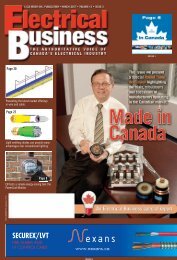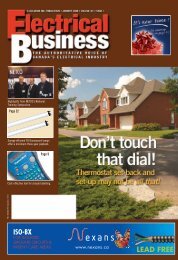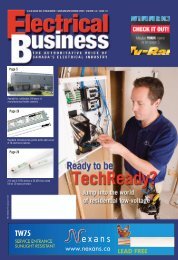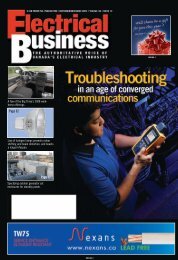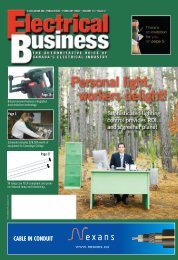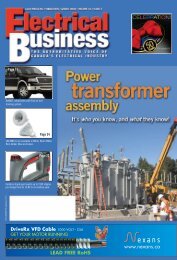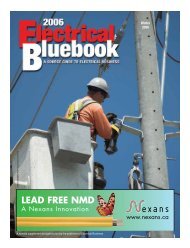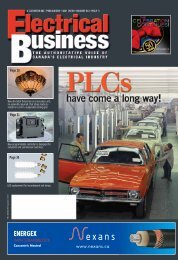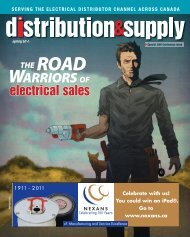FIRE ALARMS: the missing pieces - Electrical Business Magazine
FIRE ALARMS: the missing pieces - Electrical Business Magazine
FIRE ALARMS: the missing pieces - Electrical Business Magazine
Create successful ePaper yourself
Turn your PDF publications into a flip-book with our unique Google optimized e-Paper software.
Construction holdbacks<br />
Net holdbacks are a tax deferral (holdbacks Receivable less<br />
Payable), and it’s best you talk to your accountant.<br />
Income splitting and management fees<br />
How much income should you take and how much should<br />
you leave in <strong>the</strong> company?<br />
If you’re very profitable (over $350,000/year), talk to<br />
your tax accountant. If you’re making more modest sums,<br />
<strong>the</strong>n consider <strong>the</strong> following: once you go over $75,000/year<br />
(approx.) taxable income, you’re paying up to 46% tax,<br />
while <strong>the</strong> company is paying less than 20%. If you don’t<br />
need <strong>the</strong> money, don’t go into <strong>the</strong> top tax bracket. Leave <strong>the</strong><br />
money in <strong>the</strong> company.<br />
Family members who aren’t generating any income (i.e.<br />
student) could do some work in <strong>the</strong> business for which you<br />
could pay <strong>the</strong>m. They could use that money to pay you<br />
for room and board (which is tax-free to you). You will<br />
likely have to pay WCB and CPP (depending on <strong>the</strong> ages<br />
of <strong>the</strong> family members) on <strong>the</strong> income splitting. Also, if<br />
your spouse works in <strong>the</strong> business and earns $30,000 while<br />
you’re making $90,000, redistribute <strong>the</strong> income so that you<br />
Contractor Plus is The Home Depot’s<br />
NEW rewards program designed<br />
exclusively for commercial customers.<br />
As a Contractor Plus member you can collect rewards valued<br />
at up to 6% of your commercial credit card purchases, which<br />
can be redeemed for Home Depot Gift Cards.<br />
Join now!<br />
If you don’t have an account, pick up an application at <strong>the</strong><br />
contractor services desk or apply online.<br />
If you already have a commercial credit account register online at<br />
www.contractorservices.ca/contractorplus<br />
drop below $75,000. (Just make sure you can justify <strong>the</strong><br />
pay increase.)<br />
CRA has gotten very sticky on taking management fees<br />
instead of salary, reversing and reassessing <strong>the</strong>m as salary<br />
(T4 income). This can cost you money and a great deal of<br />
time, but you can avoid <strong>the</strong>m one of three ways:<br />
1. Take dividends. No CPP and minimum WCB.<br />
2. Take monthly salary like everyone else and remit<br />
<strong>the</strong> source deductions according to CRA’s ruling<br />
in your case.<br />
3. As a director, you can declare your salary in December<br />
and remit <strong>the</strong> taxes with <strong>the</strong> rest of <strong>the</strong> source deductions.<br />
(This is also <strong>the</strong> time to top up your salary.)<br />
When you retire, you and a spouse (provided you are both<br />
shareholders) can take up to $24,000 each in dividends<br />
without attracting additional tax; however, all o<strong>the</strong>r income<br />
moves up one level on <strong>the</strong> tax scale (because <strong>the</strong> company<br />
has paid taxes on <strong>the</strong> dividend).<br />
Penalties and interest<br />
When we run afoul of CRA, it levies penalty and interest<br />
charges, but you may be able to get relief from penalties<br />
INFO NO. 18<br />
3/27/07 12:08:42 PM<br />
through <strong>the</strong> Fairness Commission. If you can show genuine<br />
‘emotional’-type reasons for non- or late filing (i.e. illness/death<br />
in <strong>the</strong> family, major trauma), <strong>the</strong> commission will often reverse<br />
<strong>the</strong> penalties. Being simply “too busy” to file won’t fly.<br />
It’s not what you make—it’s what you keep<br />
Hopefully, <strong>the</strong>se suggestions will get you thinking seriously<br />
about keeping more of your hard-earned money, but talk<br />
to your tax advisor first and remember, too, that tax rates,<br />
various rules, etc., can differ between jurisdictions. Finally, if<br />
you’ve missed a tax deduction, you can file a T1 Adjustment<br />
Request and go back at least three years for reassessment.<br />
Ron Coleman, B. Comm., FCCA CMC, is a member of <strong>the</strong> Institute<br />
of Certified Management Consultants of British Columbia. A noted<br />
speaker, he has completed many inter-firm financial comparisons of<br />
groups of construction companies in Canada and <strong>the</strong> United States.<br />
Ron’s numerous published education programs include a 36-hour<br />
business management course specifically designed for ECABC. He is<br />
also author of <strong>the</strong> book, “Your Million Dollar System: How to Increase<br />
<strong>the</strong> Value of Your Construction <strong>Business</strong> by One Million Dollars in<br />
Three Years”.<br />
continued from p.13<br />
<strong>FIRE</strong> <strong>ALARMS</strong>:<br />
<strong>the</strong> <strong>missing</strong> <strong>pieces</strong><br />
Finding and reporting an unsafe condition<br />
Let’s say you’re called in to some old motel or apartment<br />
building to ‘fix’ <strong>the</strong> fire alarm system. You arrive and find<br />
a nightmare wired by <strong>the</strong> handyman owner. You repair<br />
what you can to get <strong>the</strong> system somewhat operational <strong>the</strong>n,<br />
before you can do any more, <strong>the</strong> owner sends you packing.<br />
In essence, you’ve uncovered an unsafe condition but <strong>the</strong><br />
owner refuses to authorize <strong>the</strong> work to fix it. What do you do?<br />
You do <strong>the</strong> right thing and report <strong>the</strong> situation to <strong>the</strong><br />
local AHJ. The owner will be angry with you, he’ll probably<br />
refuse to pay for <strong>the</strong> work you already did, and may<br />
even launch himself into a Privacy Act frenzy, threatening<br />
to sue you for revealing information.<br />
Remember that <strong>the</strong> safety of <strong>the</strong> public is paramount.<br />
If you were to say nothing, you would be negligent when<br />
something happened. Our FPO is very clear on <strong>the</strong> matter:<br />
if you say nothing and an incident occurs, you will be<br />
charged. We have learned to be careful in selecting clients.<br />
Generally, we perform fire alarm system work for regulars<br />
for whom we also do standard electrical.<br />
Ron Bergeron, P.Eng., one of <strong>Electrical</strong> <strong>Business</strong>’ editorial advisors,<br />
has been a professional engineer since 1969 and an electrical contractor<br />
since 1971. He received <strong>the</strong> PEO Citizenship award in 1990 and<br />
chairs <strong>the</strong> Contractor Advisory Council to <strong>the</strong> <strong>Electrical</strong> Safety Authority<br />
of Ontario. Last year he earned his Master Electrician license, whereas<br />
two years ago he became a Registered Qualified Designer.<br />
Sundry issues with fire alarm systems<br />
1.<br />
2.<br />
3.<br />
Technician identifies a defective heat detector and decides to<br />
replace it. He goes to his vehicle, finds a new one and replaces<br />
<strong>the</strong> defective rate-of-rise detector. No sooner does he finish<br />
his work than <strong>the</strong> fire alarm system activates <strong>the</strong> alarm.<br />
Explanation: It was winter. The detector in <strong>the</strong> vehicle was very<br />
cold and was subsequently installed in a warm building. The<br />
detector simply executed its rate-of-rise function.<br />
The electrician just finishes replacing a baseboard heater<br />
in an apartment hallway. Suddenly, <strong>the</strong> fire alarm<br />
system activates.<br />
Explanation: New baseboard heaters ‘cook off’ <strong>the</strong> compounds<br />
on <strong>the</strong> fins for <strong>the</strong> first few minutes. The smoke detectors<br />
reacted to <strong>the</strong> ionization.<br />
The electrician was looking for some room in which to cut<br />
unistrut with a recip saw. The only clear space available was<br />
in <strong>the</strong> electrical room. No sooner did he start cutting than <strong>the</strong><br />
fire alarm system activated.<br />
Explanation: <strong>Electrical</strong> rooms typically have smoke detectors,<br />
not heat detectors. The rapid action of <strong>the</strong> saw on <strong>the</strong> metal<br />
created ionization.<br />
www. mag.com MAY 2007 15



